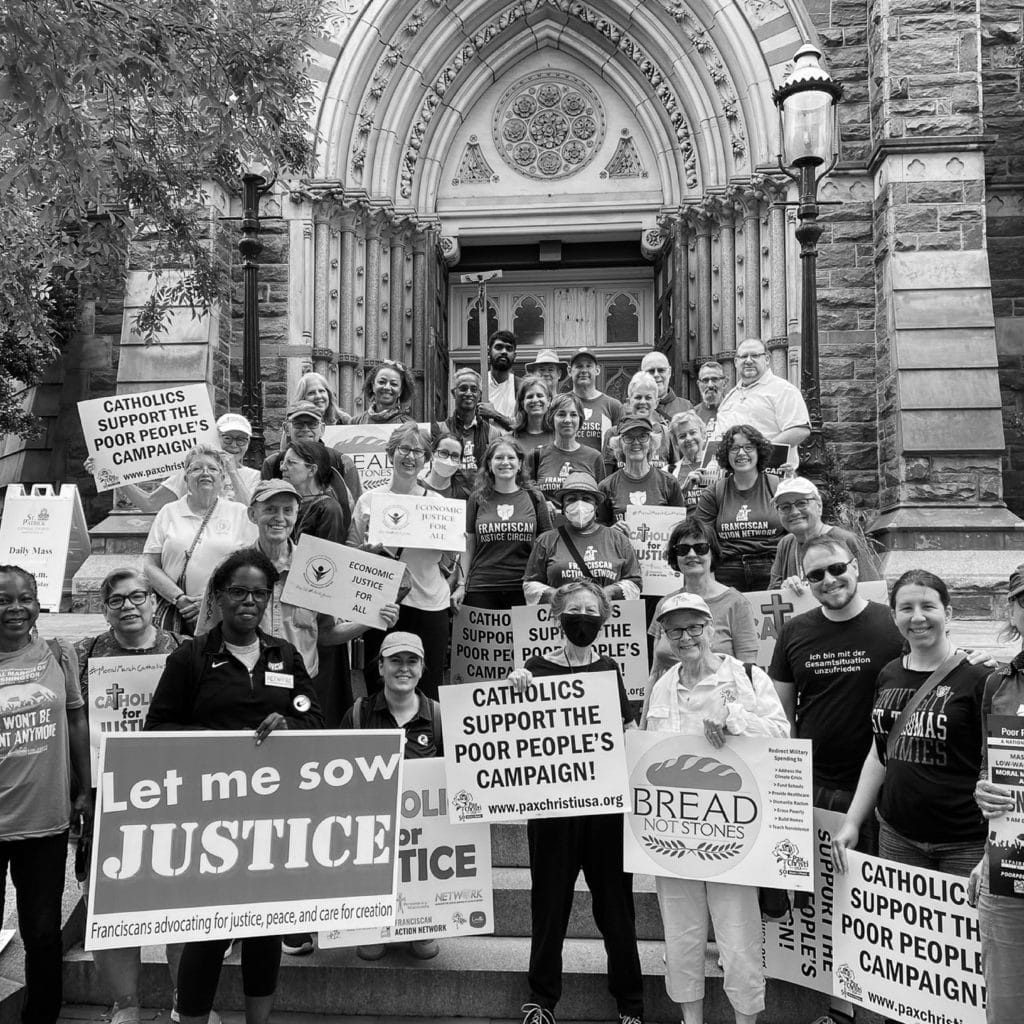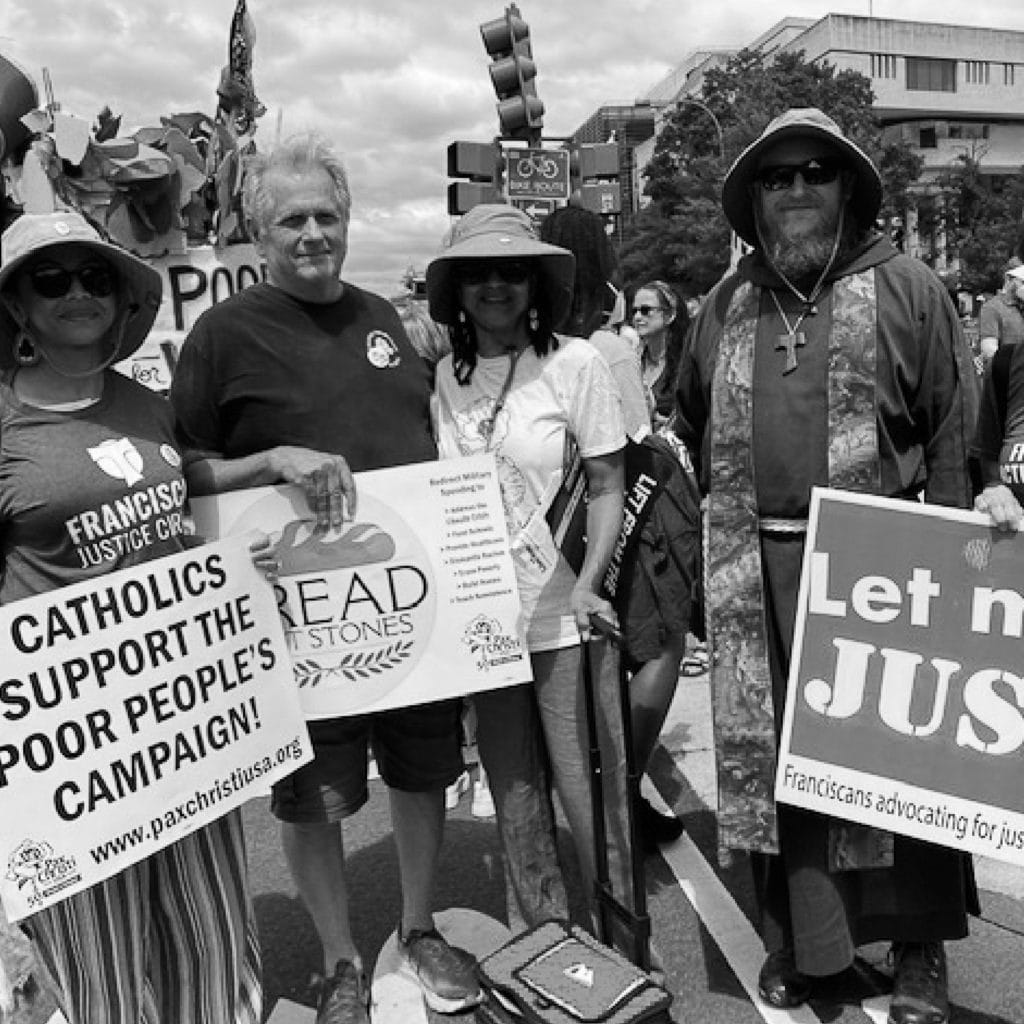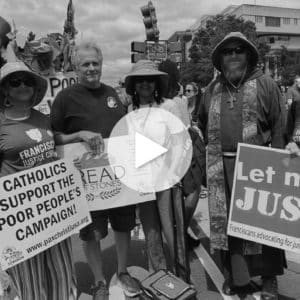Walking Humbly with God for Justice

How do you practice your faith? What are the actions that take you beyond belief and into being?
The Alternative Orthodoxy emphasizes orthopraxy over orthodoxy, teaching that love and action (right practice) are more important than speculative truth (right belief). In this article, Michele Dunne, executive director of the Franciscan Action Network (FAN), explores her practice of speaking up against racism. Here, she shares her experience at the recent Poor People’s Campaign March on Washington and to the Polls.
“The center of religious values, whether it’s Islam, Christianity, or Judaism, is how you treat the poor and the least of these. It is critical to one’s claim of loving God.”
—Rev. Dr. William Barber, co-chair of the Poor People’s Campaign: A National Call for Moral Revival

Preparing to Walk Humbly
We set up dinner in a plaza close to the White House during a blistering hot evening, wondering if anyone would come to eat. Before we knew it one thousand were there, local people in need of a meal and travelers from all over the country dining and chatting companionably.
“I wish we could do this all the time—just feed people and eat together,” said the volunteer next to me, as we served the June 17 communal meal hosted by the Poor People’s Campaign in Washington DC.
Thank goodness the weather changed during the night, and June 18 dawned cool and sparkling. My colleagues and I at FAN, one of hundreds of mobilizing partners to the Poor People’s Campaign, had worked for weeks to organize. We met on the steps of St. Patrick’s Church for a prayer that included Jesus’ central teaching — to love our neighbors as ourselves and the ancient prophet Micah’s exhortation to “do justice, love mercy, and walk humbly with your God.”
Watch this prayer service, written by Toby Harkleroad, hosted before the June 18 march on the steps of St. Patrick’s Church in downtown Washington, DC.
We also prayed with the modern prophet Sr. Thea Bowman: “help us knock down, pull down, shout down the walls of racism, sexism, classism, materialism, and militarism that divide and separate us; help us to live as your united people, proclaiming with one voice our faith, our love, our joy.”
Integrating Spirituality and Justice
Sr. Thea’s prayer reminded me why I was at the March: frustration that racism, economic injustice, and militarism are as bad—in some ways worse—in the United States today as they were when she wrote in the 1980s. It is the same reason I left another career to work with an organization that tries to bring a Franciscan voice to public policy. My colleagues at FAN and I decided this spring that we should learn from and add our voices to the largest movement in the United States speaking up against racism, economic injustice, and related problems, a mass movement started by Dr. Martin Luther King Jr. shortly before he was assassinated.

We were there not to chant slogans together but to listen [to] the witness given by impoverished and low-income people.
—Michele Dunne
As our group joined the thousands of Moral Marchers along Pennsylvania Avenue on June 18, we tried for a while to stay together—using our signs and the color of our t-shirts—but soon we were simply in the throng. Our dispersal was not important, because we were there not to chant slogans together but to listen. The main event was the witness given by impoverished and low-income people, who came to the microphone to recount their struggles, victories, and tragedies—for example, a father who told about the suicides of all three of his adult children.
Creating Real Change
As the afternoon advanced, members of our group left due to fatigue or other commitments; I left to meet with marchers from a New York church before they had to board their bus. I was touched to hear later that one member of our group stayed for five hours to hear every speaker; he wanted to accord them the respect they were due.
I wondered how a Moral March, which included people who agreed about racial and economic justice but disagreed on other issues, could bring about real change.
—Michele Dunne

As I found my way home, I wondered how a moral march–which included thousands of people who agreed about racial and economic justice but disagreed on other issues, such as abortion–could bring about real change. I recalled a saying from St. Teresa of Calcutta, who wondered how prayer could change things until she realized, “prayer changes us and we change things.”
Indeed, may the March change those of us who ate, prayed, and listened together this June, and may future marches change thousands more who will work for justice.
Reflect With Us
How do you bring about real change in your own community? As you reflect, are there other ways you can work for justice? Share your reflection with us.
The Poor People’s Campaign began in 1968 when Rev. Dr. Martin Luther King Jr. and other justice seekers began a faith-based movement to unite poor and impacted communities across the United States. Today, Rev. Dr. William Barber and many others continue this work, uniting communities with an intentional integration of spiritual activism and economic, social, and environmental justice.
Inspired by the Gospel of Jesus, and the example of Saints Francis and Clare, the Franciscan Action Network (FAN) is a collective Franciscan voice seeking to transform United States public policy related to peace making, care for creation, poverty, and human rights. Founded in 2007, FAN sees the interconnectedness of all creation and the common origin of humanity as rooted in God’s loving design for the earth and all people.
We Conspire is a new series from the Center for Action and Contemplation featuring wisdom and stories from the emerging Christian contemplative movement. Sign up for the monthly email series and receive a free invitation to practice each month.
